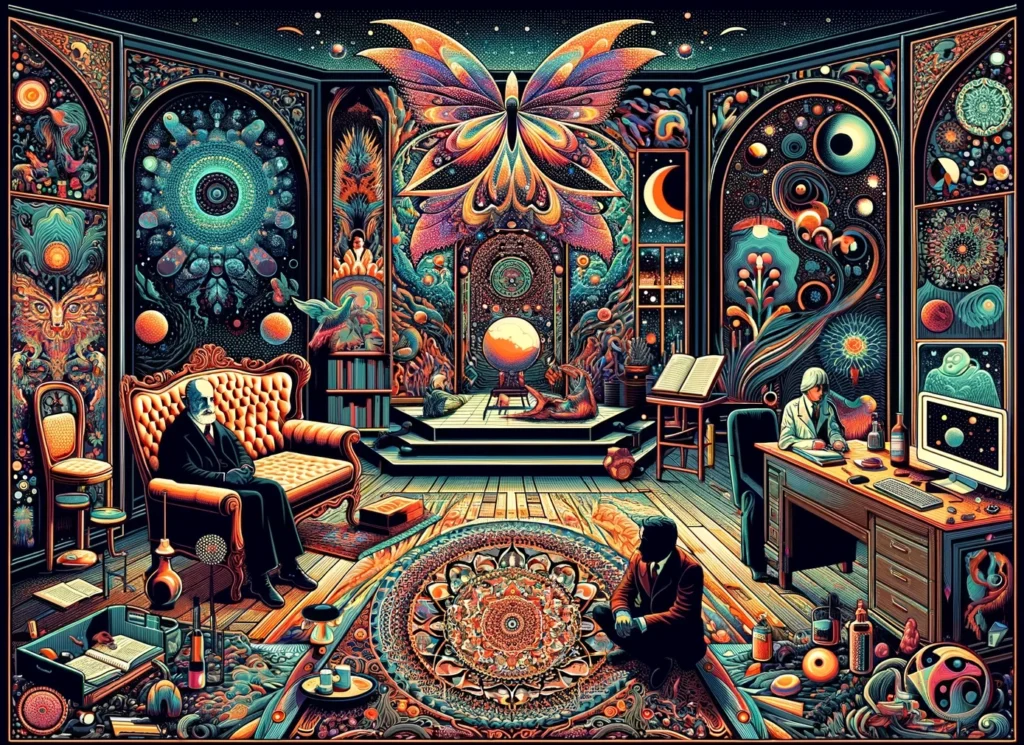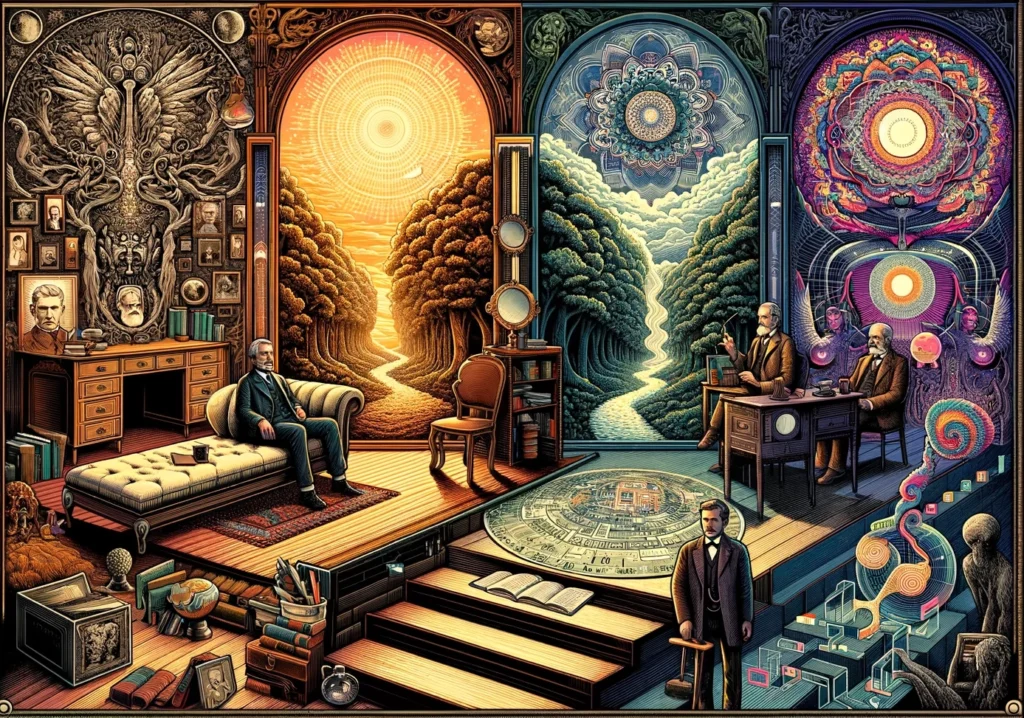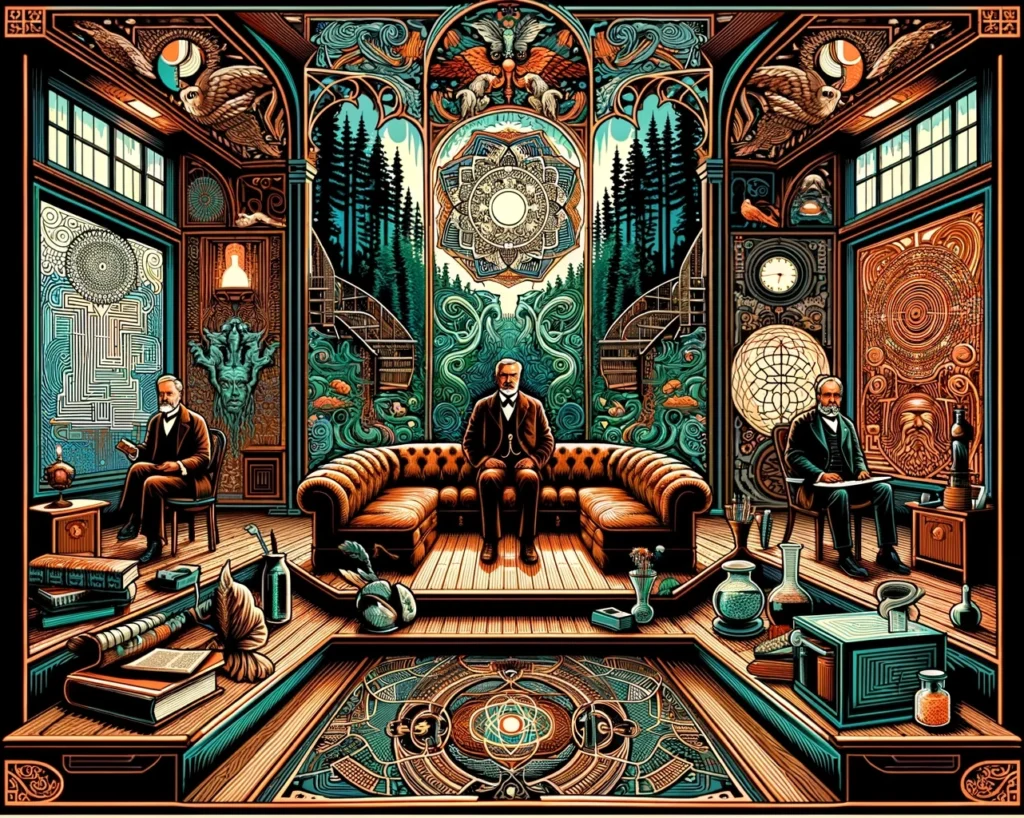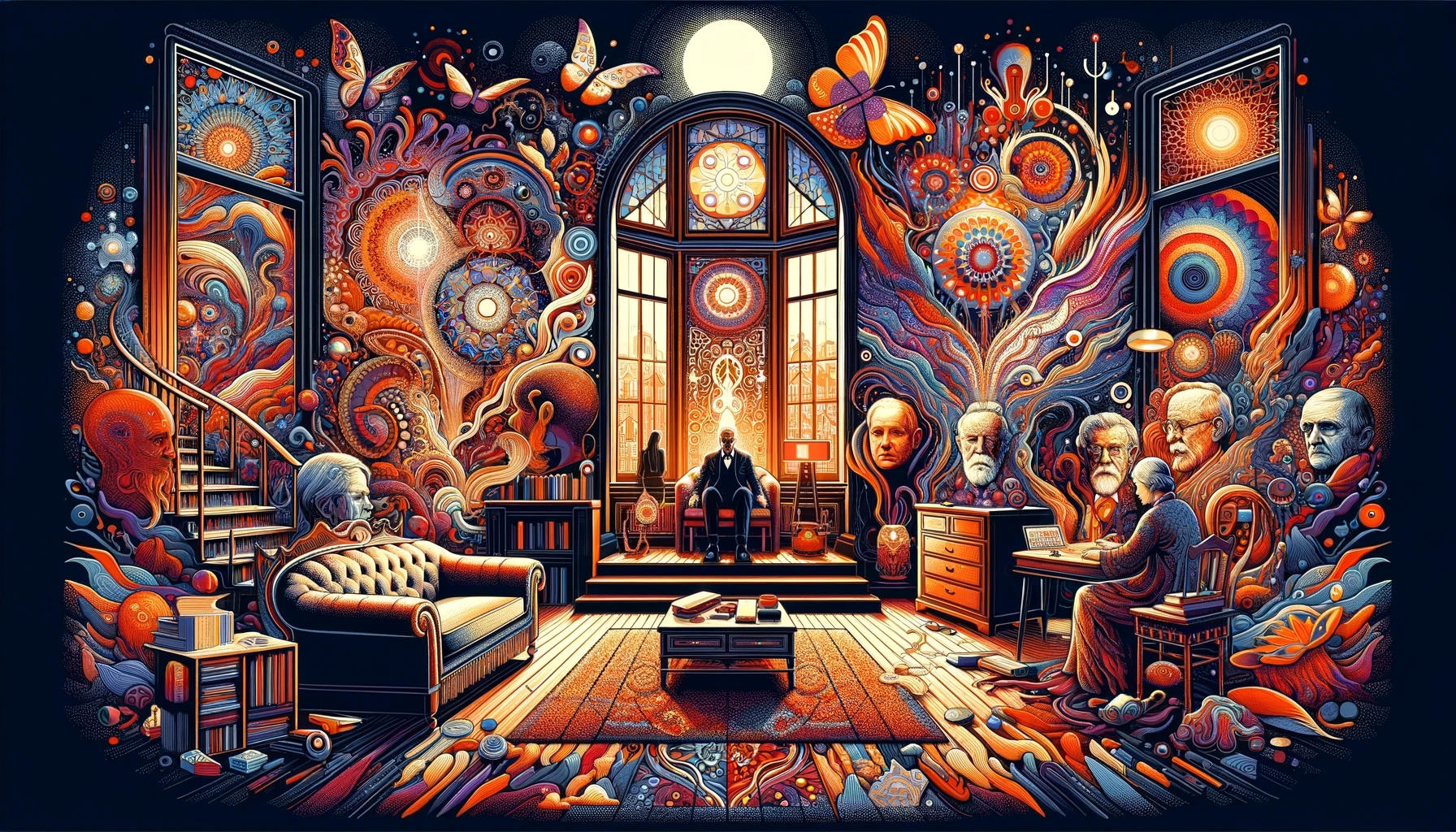Freud vs Jung vs Lacan
Lacan

Jacques Lacan was a French psychoanalyst and philosopher known for his influential theories on the human psyche, language, and subjectivity. Here are some key points he taught:
The Psychoanalytic Unconscious: Lacan believed that the unconscious mind is structured like a language, with symbols and signs that are irreducible to conscious meaning. He argued that the unconscious contains multiple levels of representation, including the “symbolic,” “imaginary,” and “real” registers.
The Mirror Stage: Lacan posited that the formation of the self is linked to the “mirror stage,” a phase in early childhood when the individual recognizes themselves in a mirror and forms an ego based on this reflection. This stage is crucial for the development of the sense of self and the establishment of the subject-object relationship.
The Father Figure: Lacan believed that the father figure plays a central role in the formation of the self, particularly in male subjects. He argued that the father represents the symbolic order and serves as a mediator between the subject and the real world.
The Real: Lacan distinguished between the “real” and the “imaginary” realms of the unconscious. The real is the domain of the unsymbolizable, the unrepresentable, and the unknowable, which cannot be captured by language or conscious thought.
The Symbolic: The symbolic realm is the domain of language, culture, and social norms, which are organized around the father figure and the symbolic order. This realm is where the subject interacts with the world through language and communication.
The Imaginary: The imaginary realm is the domain of the ego and its representations, including the self-image, identity, and narcissism. This realm is concerned with the way the subject sees itself in relation to others and the world.
The Four Discourses: Lacan proposed that there are four main discourses or ways of organizing the symbolic order: the master discourse (which upholds the dominant ideology), the oppressed discourse (which challenges the master discourse), the universal (which transcends individual differences), and the particular (which acknowledges individual differences).
The Ego and the Id: Lacan distinguished between the “ego” (the conscious, rational self) and the “id” (the unconscious, instinctual self). He argued that the ego is a social construct, while the id is a product of the unconscious mind.
The Death Drive: Lacan posited that there is a fundamental drive towards death and self-destruction, which he called the “death drive.” This drive is thought to be inherent in the human psyche and manifests itself in various ways, such as addiction or self-sabotage.
The Logos: Lacan believed that language is the fundamental structure of the universe, and that it is through language that the subject experiences the world. He posited that the “logos,” or the rational order of language, is the basis for the symbolic order and the structure of the self.
These are just a few of the key concepts taught by Jacques Lacan. His work spans multiple disciplines, including psychoanalysis, philosophy, and literary theory, and his ideas continue to be influential in fields such as psychology, sociology, and cultural studies.
Carl Jung

Carl Jung was a Swiss psychiatrist and psychoanalyst who developed several important concepts in psychology, including:
The Collective Unconscious: Jung believed that there is a shared reservoir of archetypes, or universal symbols and themes, that are present in the unconscious minds of all humans. This collective unconscious contains memories and experiences that are common to all humanity.
The Personal Unconscious: In addition to the collective unconscious, Jung believed that each individual has their own personal unconscious, which contains unique memories, thoughts, and experiences that are specific to them.
The Shadow: The shadow is a part of the personal unconscious that contains the repressed or hidden aspects of an individual’s personality. It can be thought of as the dark side of the self, containing the qualities and impulses that one does not want to acknowledge or accept.
The Anima: The anima is the feminine aspect of the male psyche, representing the nurturing and receptive qualities that are typically associated with women. Every man has an anima, according to Jung, and it is important for emotional well-being and relationships.
The Animus: The animus is the masculine aspect of the female psyche, representing the active, rational, and logical qualities that are typically associated with men. Every woman has an animus, according to Jung, and it is important for emotional well-being and relationships.
Individuation: Jung believed that the ultimate goal of psychological development is individuation, or the integration of the unconscious mind into the conscious self. This process involves becoming aware of and integrating the shadow, anima, and animus, as well as other aspects of the unconscious mind.
Archetypes: Jung believed that there are certain universal symbols and themes that appear across cultures and time, which he called archetypes. These archetypes are thought to be part of the collective unconscious and can provide a sense of connection to the larger human experience.
Synchronicity: Jung believed in the concept of synchronicity, or the idea that events in the world are connected and meaningful. He saw this as evidence of a collective unconscious that underlies all of existence.
The Self: Jung believed that the self is composed of multiple parts, including the ego, the personal unconscious, and the collective unconscious. The goal of psychological development is to integrate these parts into a whole, which he called the “Self.”
The Process of Psychological Development: Jung believed that psychological development involves a process of individuation, or becoming aware of and integrating the unconscious mind into the conscious self. This process involves confronting and integrating the shadow, anima, and animus, as well as other aspects of the unconscious mind.
These are just a few of the key concepts taught by Carl Jung. His work spans multiple disciplines, including psychology, philosophy, and literature, and his ideas continue to be influential in fields such as psychotherapy, counseling, and depth psychology
Freud

Sigmund Freud was an Austrian neurologist and founder of psychoanalysis, who developed several key concepts in psychology, including:
The Id, Ego, and Superego: Freud believed that the human psyche is composed of three parts: the id, ego, and superego. The id is the primitive, instinctual part of the self, while the ego is the rational, thinking part. The superego is the moral component of the self, representing societal norms and values.
The Unconscious Mind: Freud believed that a significant portion of the human psyche operates below the threshold of conscious awareness. This unconscious mind contains repressed thoughts, feelings, and memories that can influence behavior and emotions.
The Process of Psychoanalysis: Freud developed the technique of psychoanalysis, which involves exploring the unconscious mind through free association, dream analysis, and other methods. The goal of this process is to bring unconscious thoughts and feelings into conscious awareness, allowing the individual to gain insight and achieve catharsis.
The Concept of Libido: Freud believed that the energy behind all psychological processes is libido, or sexual drive. This energy can be directed towards various sources, such as people, objects, or activities, and can influence behavior and emotions.
The Structures of Personality: Freud believed that personality is composed of three structures: the id, ego, and superego. Each structure has different functions and operates under different psychological laws.
The Concept of Repression: Freud believed that repression is a primary defense mechanism that helps individuals cope with unpleasant thoughts or memories by pushing them into the unconscious mind.
The Concept of Projection: Freud believed that projection is the attribution of one’s own unwanted thoughts or feelings to someone else. This can lead to false accusations or
misunderstandings in interpersonal relationships.
The Concept of Rational Emotive Behavior Therapy (REBT): Freud developed REBT, a form of psychotherapy that focuses on helping individuals identify and modify maladaptive beliefs
and behaviors.
The Concept of the Unconscious Mind: Freud believed that the unconscious mind contains repressed thoughts, feelings, and memories that can influence behavior and emotions.
The Concept of Personal Unconscious: Freud believed that each individual has their own personal unconscious, which is unique to them and shaped by their individual experiences and
upbringing.
These are just a few of the key concepts taught by Sigmund Freud. His work spans multiple disciplines, including psychology, philosophy, and literature, and his ideas continue to be
influential in fields such as psychotherapy, counseling, and depth psychology










